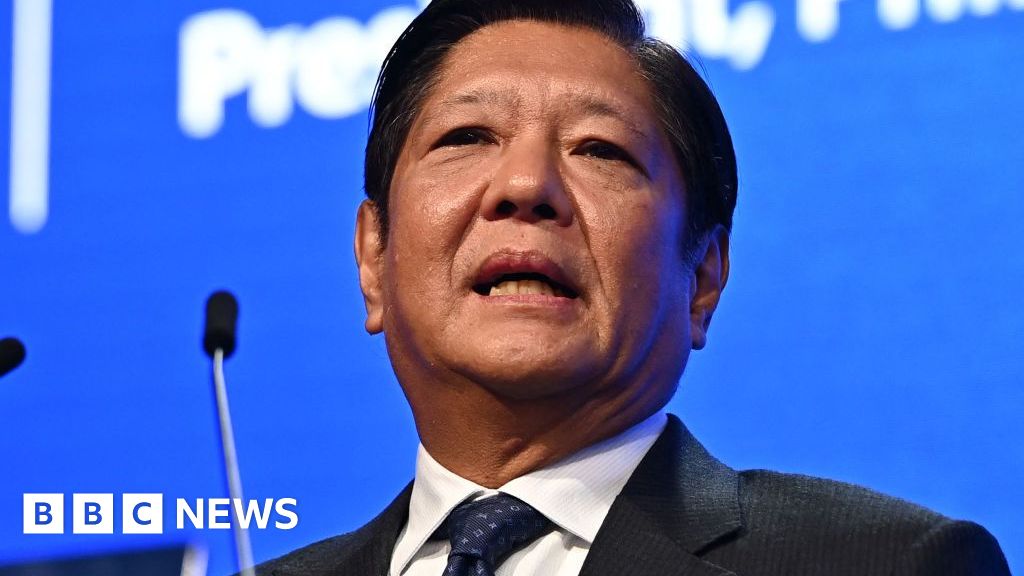Philippine President Ferdinand Marcos Jr has warned China not to cross a red line in the South China Sea, where a standoff between the countries continues to escalate.
If any Filipino died as a result of China’s wilful actions, he said on Friday, the Philippines would consider it as close to “an act of war” and respond accordingly.
Mr Marcos was speaking at a security forum in Singapore attended by defence chiefs from around the world, including the US’s Lloyd Austin.
He stressed the region remained a main focus for Washington, and that the US was only secure if Asia was too.
In recent months the longstanding dispute between China and the Philippines over territory in the South China Sea has sharpened into aggressive clashes.
Manila has complained vociferously about Chinese patrol ships firing water cannon at Philippine boats and supply vessels.
Beijing has said that it is defending its sovereignty. At the summit, a Chinese military spokesman accused the Philippines of making “provocations”.
Observers fear that any escalation could spark a conflict in the South China Sea between the Chinese and Americans. The US is bound by a treaty signed with the Philippines to come to the South East Asian nation’s defence, should it come under attack.
The US has said it will stand by its commitments to its allies in the region, and has sought to draw them closer including holding a summit with the Philippines and Japan last month.
On Friday night, Mr Marcos had just finished delivering the opening address at the Shangri-la Dialogue in Singapore when a delegate posed a hypothetical situation where Chinese water cannon killed a Filipino soldier. He was asked if he would consider that a red line, and if this would invoke the US-Philippines treaty.
“If by a wilful act a Filipino – not only serviceman, but even Filipino citizen – is killed… that is what I think very, very close to what we define as an act of war and therefore we will respond accordingly. And our treaty partners, I believe, also hold that same standard.”
He noted that Filipinos have been injured in recent clashes, but none had been killed yet. “Once we get to that point, that is certainly, we would have crossed the Rubicon. Is that a red line? Almost certainly it’s going to be a red line.”
Asked by the BBC for comment, a Chinese military spokesman said that “if only one personnel was accidentally killed in a conflict or accident that triggers war, then I really believe it’s a belligerent country”.
He also took issue with Mr Marcos criticising China’s moves to claim sovereignty in his speech, and accused the Philippines of “deflecting the blame on China”.
Hours later US Secretary of Defense Lloyd Austin said in his speech that “the harassment that the Philippines has faced is dangerous – plain and simple”.
When asked how the US would respond to the situation posed to Mr Marcos, he said that while their commitment to their treaty with the Philippines was “ironclad”, he would not speculate on how the US might react.
But he said they would continue to increase dialogue and promote freedom of navigation in the seas and skies. “Our goal is to make sure that we don’t allow things to spiral out of control unnecessarily,” he said. “A war or a fight with China is neither imminent, in my view, or unavoidable.”
Addressing a roomful of delegates mostly from Asia, he underscored the US’ commitment to the Indo-Pacific region, which he said remained their priority, despite the Ukraine and Gaza conflicts.
He listed the ways they were building up various Asian countries’ defences through military exercises, agreements, and US troop presence. “The United States can be secure only if Asia is secure,” he said.
One key part of the US strategy is beefing up the Philippines’ military. A years-long defence roadmap with the US may see the superpower sending drones, military transport aircraft and defence systems. Manila is also angling to get a sizeable chunk of a proposed US military aid package for its allies in the Indo-Pacific region.
The Philippines is also increasing its own military spending and has acquired missiles from India.
At the summit, the Chinese military said that the Philippines was “emboldened” by outside powers and had “broken its own promises and made provocations” over the disputed Second Thomas Shoal, where Manila has established a military outpost.
They also objected to the US sending a mid-range missile system to the Philippines in a recent joint military exercise, saying it “posed a real threat to regional security”.
Referring to Mr Austin’s speech, a Chinese military spokesman said the US’ strategy would “create division, provoke confrontation and undermine stability” in the region. It appealed to South East Asian countries to resolve disagreements with China through dialogue “rather than inviting wolves into our house and playing with fire”.
But both the US and China have also signalled they are keen on improving communications to avoid conflict.
Following a meeting between Mr Austin and Mr Dong, both sides said they were working on resuming telephone conversations between military commanders – a key hotline severed in 2022 after then-US House Speaker Nancy Pelosi’s visit to Taiwan – and establishing a crisis communications working group.
“I told Mr Dong that if he calls me on urgent matter, I will answer the phone. And I certainly hope that he’ll do the same,” said Mr Austin, who added that such communication would improve stability in the region.
The Chinese military said the meeting was “positive, practical and constructive” and that the US-China relationship was “stabilising from further deterioration”.

